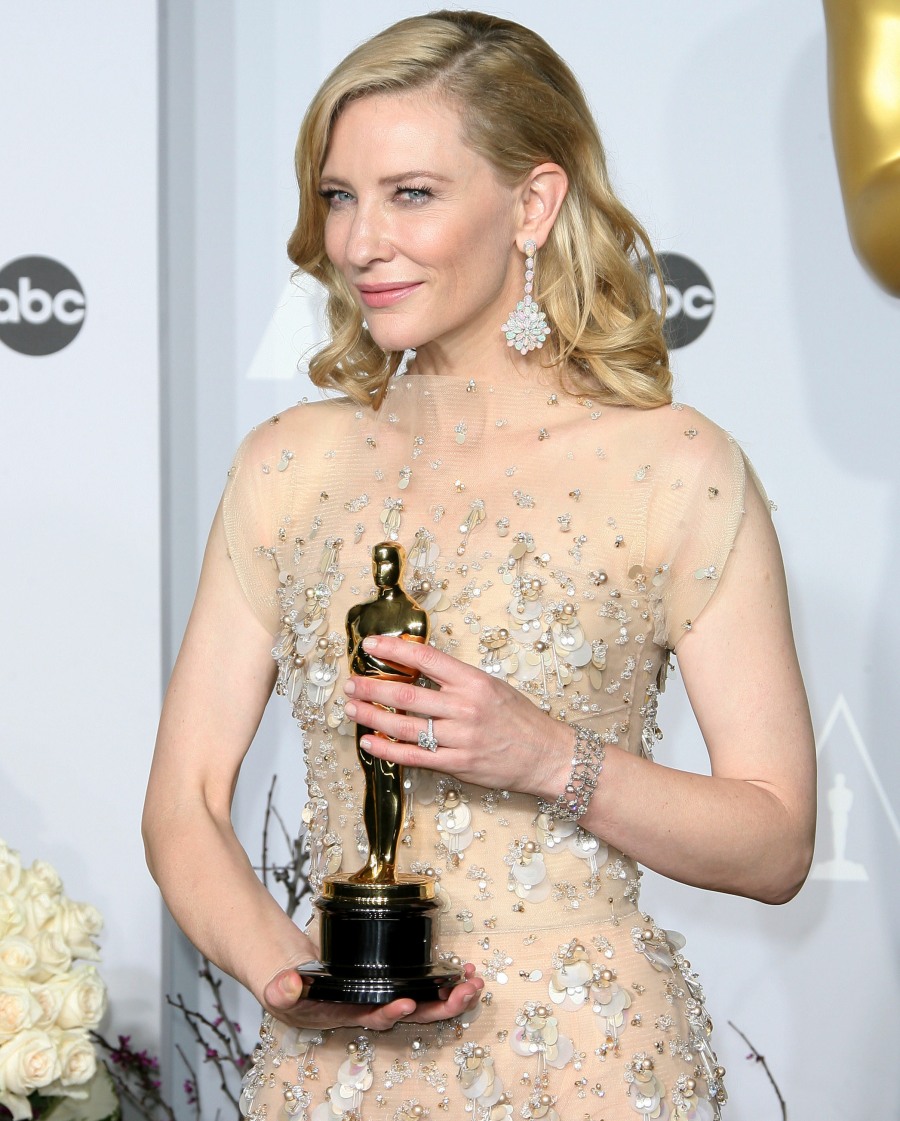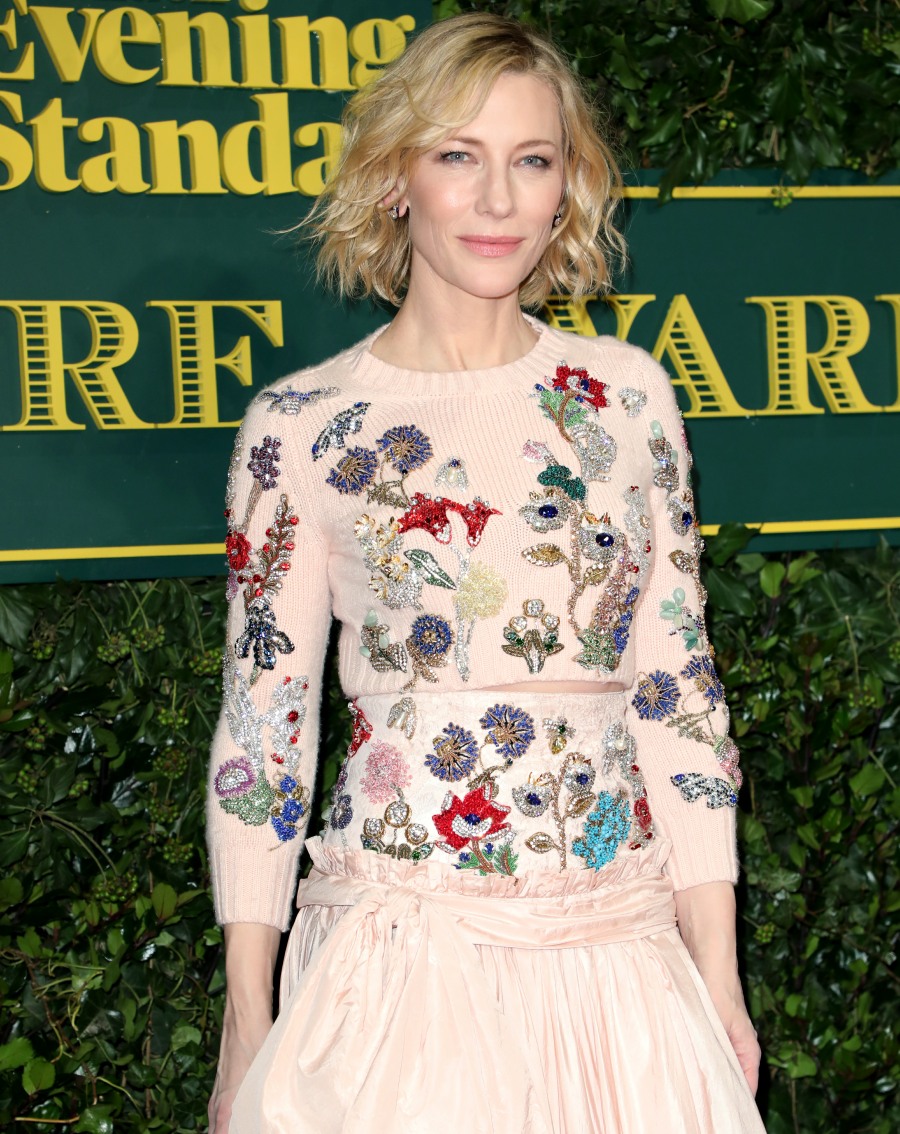Cate Blanchett on #MeToo: Social media is ‘not the judge and jury’
March 23, 2018In February 2014, Dylan Farrow wrote an op-ed for the New York Times about how Woody Allen, her father, had molested her when she was a child. This was not the first time most people had heard *something* about Dylan and the accusations, but to be fair, that was the first time Dylan ever came out as an adult and told her story. She did so by name-checking Cate Blanchett, who was then in the middle of what would be a successful Oscar campaign for Woody Allen’s Blue Jasmine. Blanchett swept up all of the awards, across the board, for her performance. And I tend to believe that will be the last Woody Allen film to ever win an Oscar.
While I believed Dylan then and I believe her now, I sort of thought (and I still think) that it’s possibly the wrong strategy to target the actresses who worked with Woody. By all means, ask the actors and actresses about why they chose to work with Woody overall, especially after February 2014. But Blanchett’s line remained the same: she had no clue about Dylan’s accusations when she worked with Woody, and clearly, she hasn’t done it since. Blanchett sat down with Christiane Amanpour recently and Amanpour asked her about Woody and Dylan.
Cate Blanchett sat down for an interview with CNN’s Christiane Amanpour where she spoke of the man she worked with on Blue Jasmine—a film that ultimately earned her an Oscar win for Best Actress in 2014. “How do you juxtapose being a #MeToo proponent, a Time’s Up proponent, and staying silent or having worked with Woody Allen?” Amanpour asked the 48-year-old star.
In response to the question, Blanchett revealed, “I don’t think I’ve stayed silent at all. At the time that I worked with Woody Allen, I knew nothing of the allegations. At the time, I said it’s a very painful and complicated situation for the family, which I hope they have the ability to resolve… If these allegations need to be reexamined which, in my understanding, they’ve been through court, then I’m a big believer in the justice system and setting legal precedents. If the case needs to be reopened, I am absolutely, wholeheartedly in support of that.”
And while speaking on digital hashtags like #MeToo, the star made her opinion clear regarding platforms including Instagram and Twitter.
“Social media is fantastic about raising awareness about issues, but it’s not the judge and jury,” Blanchett said. “I feel that these things need to go into court, so if these abuses have happened, the person is prosecuted and so someone who is not in the shiny industry that I am can use that legal precedent to protect themselves,” Blanchett continued. “Always, in my industry or any other industry, they’re preyed upon because they’re vulnerable.”
Let’s take it point by point.
Re: “If these allegations need to be reexamined which, in my understanding, they’ve been through court, then I’m a big believer in the justice system and setting legal precedents.” They didn’t go to court. The prosecutor didn’t want to traumatize Dylan any further, so he dropped it.
It’s not like Woody was ever charged with child molestation, put on trial and found not guilty. The way Cate incorrectly summarizes this is pissing me off. So she had never heard Dylan’s story before February 2014 – okay, I’ll believe Cate. But how can she have not, like, read a few articles about Dylan’s case in the years since then?
Re: “Social media is fantastic about raising awareness about issues, but it’s not the judge and jury.” STOP SAYING THIS. No one is saying that someone should be found guilty of criminal charges based on a tweet. Literally no one is arguing that. #MeToo sprang up in part because women were tired of being disbelieved by the justice system, by lawyers, by the men in charge, by their bosses (some of whom were the abusers), etc. The argument of “well if you want to call yourself a victim, then you better go to the cops and file a report” disregards just how disbelieved women have been historically. Now that being said, I understand the larger argument Cate is making, which is basically that telling your story in public and being believed is the first step, and now you should seek justice legally and criminally so that abusers will have to be penalized beyond “needing to hire a crisis manager to weather a social media storm for six months.”
Photos courtesy of WENN.





